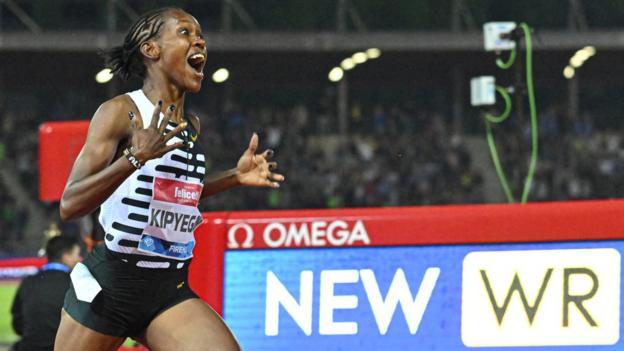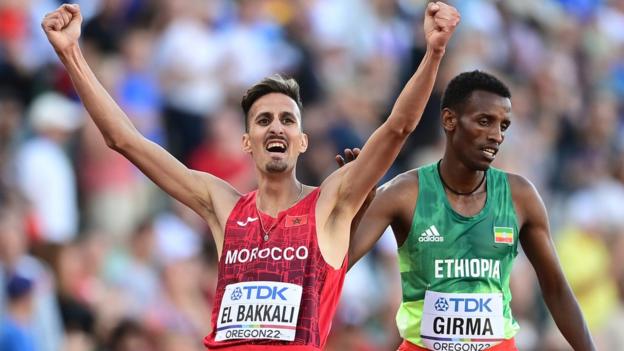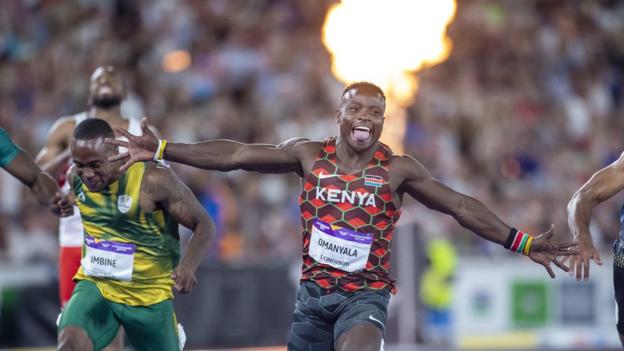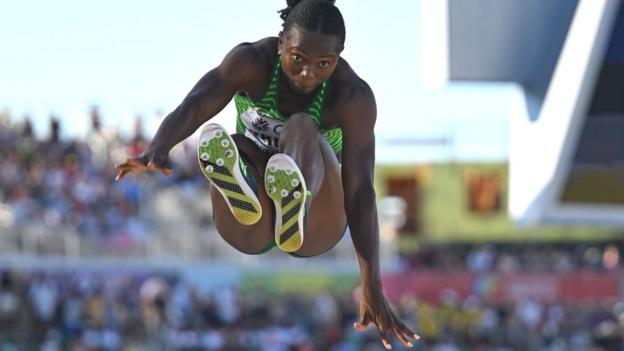This website uses cookies so that we can provide you with the best user experience possible. Cookie information is stored in your browser and performs functions such as recognising you when you return to our website and helping our team to understand which sections of the website you find most interesting and useful.

Athletics fans across Africa are turning their attention to the Hungarian capital Budapest for the World Athletics Championships.
At last year's event in Oregon, Ethiopia and Kenya finished second and fourth respectively in the medal table
, but other African nations lagged some way behind.
An overall total of 28 medals was divided between just seven nations, with Morocco, Nigeria and Uganda joining Ethiopia and Kenya in claiming at least one gold.
So can the continent improve on that performance when the action begins on Saturday 19 August? BBC Sport Africa turns prospector in a bid to unearth the leading contenders for this year's gold rush.
Keeping the Faith
Of all the African athletes competing in Budapest, few appear as nailed on for a gold medal as Kenyan superstar Faith Kipyegon, considered by many as the greatest female 1500m runner in history.
Of the last five World Championships or Olympics dating back to 2016, the 29-year-old has only missed out on gold once - and that was in 2019 when the Doha World Championships took place 15 months after Kipyegon gave birth to her daughter.
In addition to her two Olympic and two World Championship titles, Kipyegon also broke the 1500m world record in June. A week later, she stunned many by smashing the 5,000m world record - in only her third race over the distance.
Finishing behind Kipyegon in the 1500m in Oregon last year was Gudaf Tsegay. But the Ethiopian would turn silver into gold five days later when securing the biggest title of her career in the 5,000m.
The 26-year-old says she is now focusing on the longer distance, recently telling BBC Sport Africa: "I want to win the World Championships again."
Tsegay's compatriot, Letesenbet Gidey, is the reigning 10,000m champion and will no doubt be a contender again in Budapest.
Also bidding to retain a title won in Oregon is Morocco's Soufiane El Bakkali, the Olympic champion and self-declared "king of the steeplechase".
The 27-year-old was tactically superb as he ended 15 years of Kenyan dominance last time out and heads to Hungary unbeaten over the distance since September 2021.
Ethiopia's Lamecha Girma had to settle for silver in both of those races won by El Bakkali but showed his class in June when the 22-year-old smashed the world record in Paris as he ran 7:52.11, taking nearly two seconds off the previous mark set 19 years earlier.
Kenya's Simon Koech, 20, is also a promising rising star of the 3,000m steeplechase. He has the third fastest time in the world this year behind Girma and El Bakkali.

In the men's 10,000m, Uganda's Joshua Cheptegei is bidding for a third straight world title.
Should he pull it off, the 26-year-old will move a step closer to copying the achievements of legendary Ethiopian duo Haile Gebrselassie and Kenenisa Bekele, both of whom won four in a row.
Cheptegei's possible path to glory has become less cluttered after compatriot Jacob Kiplimo, 22, was forced to pull out with a hamstring injury just a week before the start of the action in Budapest, but Ethiopians Berihu Aregawi and Selemon Barega, the fastest duo in the world so far this season, will push Cheptegei hard.
Making a run for it
Athletes spend months, if not years, preparing to peak at major championships, so it was not hard to understand the anger of competitors whose hopes were dashed by visa issues before the last edition in Oregon.
Kenyan sprinter Ferdinand Omanyala was among those to suffer a combination of both the United States' strict entry requirements and complications of the coronavirus pandemic as the African 100m champion received his visa just one day before his first race.
He landed three hours before his opening heat, with customs and migration still to clear, allowing little time for the necessary mental and physical preparation.
The 27-year-old reached the semi-finals but will be hoping to go considerably further in Budapest, as will South Africa's Akani Simbine who finished fifth in the 100m final in Oregon.

Another one to watch is Botswana's double world Under-20 champion, Letsile Tebogo, who also reached the 100m semi-finals last year, having become the youngest man to win the African 200m title.
Like Tebogo, Liberian flyer Joseph Fahnbulleh will mainly be targeting the 200m in Budapest, having finished just four hundredths of a second outside the medal places in Oregon.
Wayde van Niekerk can expect to be the subject of intense focus as the 400m world record holder continues his impressive comeback following six years blighted by injury, with the South African unbeaten in three Diamond League events so far this season.
He might be the fourth fastest in the world this year but he remains behind Zambia's surprise Commonwealth champion Muzala Samukonga, whose time of 43.91 seconds puts him second on the list going into the championships.
The 20-year-old sensation has been struggling with injury but, fitness issues aside, pundits will be watching to see if he can once again pull off the kind of remarkable late surge that saw him storm to gold down the home straigh
t in Birmingham last year.
In the women's sprints, Marie-Josee Ta Lou will hope to maintain her good form.
The Ivorian - who set an African 100m record of 10.78 in 2021 - finished seventh in last year's final which was won by Jamaica's Shelly-Ann Fraser-Pryce.
Despite now being 34, Ta Lou can take heart from the fact that Fraser-Pryce was 35 when she crossed the line to claim her fifth world title.
Zango set for top step?
Burkina Faso had their most successful World Athletics Championships last time out when the country's greatest athlete, triple jumper Hugues Fabrice Zango, took silver - an improvement on the bronze he gained in 2019.
No other Burkinabe athlete has ever won a medal at the championships, and having also won the country's first Olympic medal, at the Tokyo Games, Zango is now eyeing the gold that has so far eluded him on the world stage.
However, his main rival, Portugal's Pedro Pichardo, is still around and the reigning Olympic and world champion is in good form, having set a national record when winning the European Indoor Championships in March.
Also hoping to jump into history is Zango's compatriot Marthe Koala, whose 6.94m leap is the 10th-longest long jump in the world this season.
It is a mark that makes it unlikely she will win gold, but perhaps proves that the country is focusing on the jumping events as it eyes athletics success.
Nigeria won its first ever World Championship gold in Oregon thanks to Tobi Amusan, with the 100m hurdler breaking the world record in her semi-final en route to glory.

But the 26-year-old, who is also Commonwealth Champion, is unlikely to be in Budapest after she was charged by the Athletics Integrity Unit for missing three anti-doping tests - a charge she denies.
Amusan is hoping for last-minute clearance, but this appears to be a race against time she is unlikely to win.
In her probable absence, compatriot Ese Brume could step up, with the long jumper having added silver in Oregon to her bronzes from the Tokyo Olympics and the Doha World Championships in 2019.
With her German rival Malaika Mihambo, who has a Tanzanian father, ruled out with a thigh injury, Brume has a chance to grab top spot by continuing her steady improvement.
If she can jump into history by claiming a world title that no African has ever won, she will emulate fellow long jumper Chioma Ajunwa, the winner of Nigeria's first ever Olympic gold medal in 1996.



 Africana55 Radio
Africana55 Radio 
